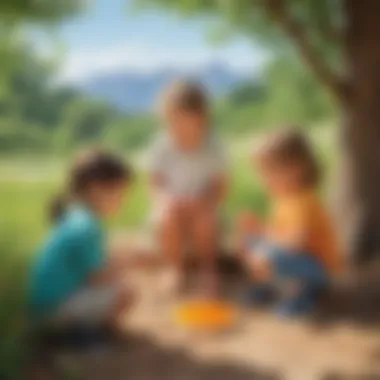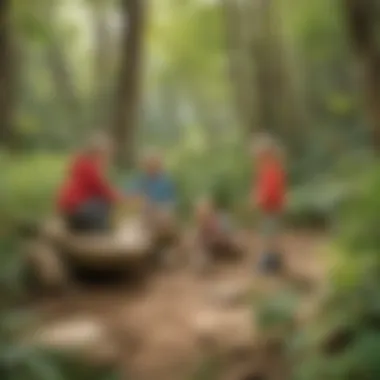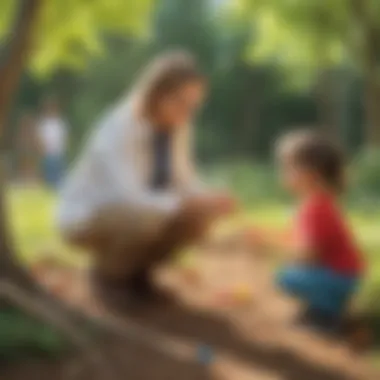Unlocking the World: Preschool Outdoor Experiences for Holistic Development


Science Fun Facts
Outdoor experiences for preschoolers offer a myriad of benefits, ranging from fostering physical health to enhancing cognitive skills. Engaging in nature-based activities can boost creativity and curiosity, paving the way for comprehensive development in young children.
Discover the Wonders of Science
Exploring various scientific concepts through outdoor activities opens up a world of learning opportunities for preschoolers. From observing plant growth to investigating animal behavior, nature becomes a rich classroom for hands-on exploration and discovery.
Science Quiz Time
Interactive quizzes tailored to outdoor learning experiences can make the educational journey enjoyable for preschoolers. By incorporating brain teasers related to nature and the environment, children can test their knowledge in a fun and engaging manner.
Science Experiment Showcase
Delve into fun and engaging outdoor experiments specially designed for preschoolers. Step-by-step instructions coupled with a detailed materials list ensure a safe and exciting learning environment. Integrate safety tips and precautions to enhance the educational experience.
Introduction
In the realm of early childhood development, the outdoor environment plays a pivotal role in shaping the growth and learning of preschoolers. This article delves deep into the significance of outdoor experiences for young children, highlighting their crucial importance in fostering holistic development and providing abundant learning opportunities. Through exploring the great outdoors, preschoolers can immerse themselves in a world replete with sensory stimuli and interactive engagement, laying a robust foundation for a well-rounded educational journey.
Significance of Outdoor Experiences
The role of outdoor play in early childhood development
Embarking on outdoor play adventures is not merely a recreational pursuit but a fundamental aspect of a child's developmental trajectory. The engagement with the natural world allows children to hone their sensory perceptions, fine-tune their motor skills, and cultivate a profound appreciation for the environment. The freedom of movement and exploration offered by outdoor play contributes significantly to enhancing children's creativity, problem-solving abilities, and resilience in navigating challenges. It serves as a gateway to fostering a deeper connection with nature and peers, nurturing a sense of wonder and curiosity that is indispensable for a child's cognitive and emotional growth.


Overview of the Article
As we meander through this enlightening guide, the key aspects covered will shed light on the myriad benefits and joys of outdoor activities for preschoolers. From delving into physical development through honing gross and fine motor skills to enhancing cognitive abilities by stimulating problem-solving skills, the article transcends mere play by delving into the profound ways in which outdoor experiences can shape a child's learning odyssey. By exploring the interactive realms of nature walks, sensory play, and outdoor art, parents and educators will acquire practical insights into curating outdoor activities that ignite imagination and fortify social-emotional bonds. Through integrating science and nature lessons seamlessly into outdoor play, the article advocates for a holistic approach to education that seamlessly blends classroom learning with the vibrant tapestry of the natural world.
Benefits of Outdoor Activities for Preschoolers
Outdoor activities for preschoolers play a pivotal role in their holistic development. These experiences are not just about fun; they significantly contribute to various aspects of a child's growth. Physical, cognitive, social, and emotional development are all nurtured through outdoor play, making it a vital component of early childhood education. By engaging in outdoor activities, preschoolers can enhance their gross and fine motor skills, promote cognitive development, build social skills, and boost their emotional well-being. Parents and educators need to recognize the immense value that outdoor experiences bring to a child's overall development.
Physical Development
Gross and fine motor skills enhancement
Gross and fine motor skills enhancement through outdoor activities is crucial for preschoolers' physical development. Running, jumping, climbing, and playing with outdoor equipment help children improve their coordination, balance, and strength. Fine motor skills, such as picking up small objects or manipulating tools during outdoor art activities, also receive a significant boost. These activities promote muscle development and overall physical health while allowing children to explore their physical capabilities in a natural environment. Outdoor play becomes the perfect avenue for children to strengthen their bodies and improve their motor skills, laying a foundation for healthy physical development.
Health benefits of outdoor play
The health benefits of outdoor play for preschoolers are immense, focusing on both physical and mental well-being. Exposure to natural light and fresh air is essential for children's overall health, aiding in the development of strong bones and muscles. Outdoor play also encourages physical activity, which is crucial in combating sedentary lifestyles and health concerns like childhood obesity. Furthermore, the sensory stimulation provided by outdoor environments has a positive impact on children's mental health, reducing stress levels and promoting a sense of well-being.
Cognitive Development
Enhancement of problem-solving skills
Engaging in outdoor activities promotes the enhancement of problem-solving skills in preschoolers. While navigating the challenges presented by nature - such as climbing over obstacles or finding solutions during scavenger hunts - children learn to think critically and apply strategic thinking. The dynamic outdoor environment offers diverse opportunities for children to encounter and solve problems, fostering their ability to analyze situations, make decisions, and overcome obstacles independently. This hands-on approach to learning encourages children to develop crucial problem-solving skills that benefit their cognitive growth.
Stimulating creativity and imagination
Outdoor play serves as a powerful stimulant for nurturing children's creativity and imagination. The open-ended nature of outdoor environments sparks imaginative play, allowing children to explore, invent, and discover new possibilities. Whether building structures with natural materials, pretending to be explorers in a jungle setting, or creating art with found objects, outdoor play encourages children to think creatively and express themselves freely. By engaging in imaginative activities outdoors, preschoolers develop their creative thinking skills and expand their imaginative capacities in a stimulating natural setting.


Social and Emotional Development
Building social skills through group play
Group play in outdoor settings offers preschoolers valuable opportunities to build essential social skills. Interacting with peers in a natural environment encourages collaboration, communication, and cooperation. Through group activities such as building sandcastles together, playing team sports, or engaging in cooperative games, children learn to share, take turns, and work collectively towards common goals. These social interactions foster the development of empathy, teamwork, and relationship-building skills, laying a foundation for positive social development.
Boosting confidence and self-esteem
Outdoor activities play a significant role in boosting preschoolers' confidence and self-esteem. Overcoming challenges outdoors, such as climbing a challenging structure or completing a nature-inspired art project, empowers children and instills a sense of achievement. The freedom to explore, experiment, and succeed in outdoor environments builds children's self-confidence, encouraging them to take risks, overcome fears, and develop a positive self-concept. By providing opportunities for success and recognizing individual achievements, outdoor play cultivates a strong sense of self-worth and resilience in preschoolers.
Ideas for Outdoor Play
Nature Walks and Scavenger Hunts
Exploring the natural environment
When we talk about exploring the natural environment with preschoolers, we are delving into a realm of endless possibilities for discovery and learning. The natural environment serves as a classroom without walls, offering children the chance to observe, touch, smell, and interact with the wonders of nature. From feeling the texture of tree bark to listening to birds chirping, every moment in nature presents a unique learning opportunity. This hands-on experience not only enhances children's sensory development but also fosters their appreciation for the world around them. By immersing in the natural environment, preschoolers can develop a sense of empathy towards living beings and cultivate a curiosity that stimulates their inquisitive minds.
Engaging in interactive learning
Engaging preschoolers in interactive learning during nature walks and scavenger hunts sparks their creativity and critical thinking skills. By turning outdoor exploration into a game or a quest to find hidden treasures, children are motivated to actively participate and problem-solve collaboratively. This interactive approach encourages teamwork, communication, and decision-making, promoting social skills and building confidence. Moreover, the hands-on nature of scavenger hunts allows children to apply their classroom knowledge in real-life scenarios, reinforcing their understanding of concepts through practical engagement. Through interactive learning in the outdoors, preschoolers not only sharpen their cognitive abilities but also develop a profound connection with the natural world.
Sensory Play
Utilizing senses for exploration
Incorporating sensory play into outdoor activities enriches the preschoolers' learning experience by stimulating their senses and enhancing their cognitive development. Utilizing senses for exploration allows children to engage with their surroundings in a meaningful and immersive way, fostering a deeper understanding of the environment. Whether it's feeling the cool breeze on their skin, smelling the earthy scent of soil, or hearing the rustle of leaves, sensory play invites children to interpret the world through a multisensory lens. By encouraging preschoolers to explore and experiment with their senses, educators and parents can support the development of neural pathways associated with perception, cognition, and memory, laying a solid foundation for future learning and comprehension.


Enhancing sensory perception
Enhancing sensory perception through outdoor activities not only refines the preschoolers' sensory abilities but also promotes self-regulation and emotional well-being. By engaging in activities that challenge their senses, such as identifying objects by touch alone or distinguishing scents in nature, children learn to focus their attention, discriminate between stimuli, and interpret sensory information effectively. This heightened sensory awareness not only improves their perceptual skills but also nurtures their emotional intelligence, helping them recognize and manage their feelings in different environments. Through enhanced sensory perception, preschoolers develop a heightened sensitivity to the nuances of the world around them, shaping their experiences and interactions in a more intentional and enriching manner.
Outdoor Art and Creativity
Expressing creativity in an outdoor setting
Encouraging preschoolers to express their creativity in an outdoor setting provides them with a dynamic canvas to explore artistic expression and imaginative thinking. Outdoor environments offer a plethora of natural materials and scenic inspirations that ignite children's artistic sensibilities and visual storytelling. Whether it's painting with natural pigments, sculpting with mud and clay, or crafting nature-inspired collages, outdoor art activities enable children to unleash their creative potential in a liberating and unconfined space. By allowing preschoolers to experiment with different art forms and mediums outdoors, educators and parents nurture their artistic confidence, self-expression, and aesthetic appreciation. This free-flowing creative process not only cultivates a sense of artistic ownership but also instills a love for nature, as children draw inspiration from the beauty that surrounds them.
Using natural materials for art projects
Utilizing natural materials for art projects empowers preschoolers to connect with the environment on a sensory and creative level, enriching their artistic endeavors with authenticity and organic textures. By gathering twigs, leaves, flowers, and rocks from their outdoor surroundings, children engage in a sustainable and eco-conscious approach to art-making that emphasizes resourcefulness and environmental stewardship. Using natural materials not only introduces children to the concept of upcycling and repurposing but also encourages them to view the natural world as a vibrant source of artistic inspiration. By incorporating elements of nature into their art projects, preschoolers learn to appreciate the beauty of imperfection, embrace the uniqueness of each material, and create meaningful artwork that reflects their ecological consciousness and artistic ingenuity.
Safety Considerations for Outdoor Activities
Safety considerations for outdoor activities are paramount when engaging preschoolers in outdoor play. In the realm of early childhood development, ensuring a safe environment fosters not only physical wellness but also cognitive and emotional growth. By meticulously addressing safety measures, parents and educators can create a conducive space for children to explore and learn. Safety considerations encompass various elements, such as adult supervision, risk management, appropriate dressing for weather conditions, and monitoring weather forecasts. Each aspect plays a crucial role in mitigating potential hazards and maximizing the benefits of outdoor experiences.
Supervision and Risk Management
Embarking on outdoor adventures with preschoolers necessitates diligent adult supervision. Overseeing children during playtime allows for immediate intervention in case of emergencies or risky situations. The importance of adult supervision lies in its ability to provide a sense of security and guidance to young learners, enabling them to navigate challenges with support. While adult supervision ensures safety, it also encourages independence and autonomy in children, striking a balance between safeguarding and empowering their exploration.
Assessing and minimizing potential risks is another essential component of effective risk management. By identifying and evaluating potential hazards in the outdoor environment, parents and educators can proactively implement measures to minimize risks. This proactive approach enhances child safety while preserving the element of adventure and discovery during outdoor activities. Assessing risks equips adults with the knowledge to create a risk-aware culture, promoting a safe yet stimulating outdoor experience for preschoolers.
Weather Conditions and Preparedness
Dressing appropriately for outdoor play is key to ensuring children's comfort and well-being during outdoor activities. Suitable clothing that aligns with the prevailing weather conditions safeguards children from discomfort or health issues caused by exposure to the elements. By dressing children in layers during colder weather or providing sun protection during sunny days, adults can optimize the outdoor play experience for preschoolers.
Monitoring weather forecasts is a proactive strategy that enhances preparedness for outdoor excursions. Staying informed about upcoming weather conditions enables parents and educators to make informed decisions regarding outdoor activities. By adjusting plans based on weather forecasts, adults can ensure the safety and enjoyment of children, avoiding potential weather-related dangers. This proactive approach underscores the importance of foresight and planning in creating enriching and secure outdoor experiences for preschoolers.
Tips for Maximizing Outdoor Learning Experiences
Ensuring preschoolers make the most of outdoor activities is crucial for their development. This section delves into key strategies to optimize learning opportunities in natural settings. By implementing these tips, parents and educators can enhance the educational value of outdoor experiences for young children. Emphasizing the importance of active exploration and hands-on learning, this guide aims to foster curiosity and engagement in outdoor environments. -### Encouraging Curiosity and Exploration -### Allowing freedom for discovery Encouraging children to explore and discover on their own can lead to profound cognitive and emotional growth. Allowing preschoolers the freedom to investigate nature independently fosters a sense of wonder and curiosity. This autonomy promotes creativity, problem-solving skills, and a deeper connection with the outdoor world. By giving children the opportunity to make their own discoveries, parents and educators nurture a lifelong love for learning and exploration. -### Promoting inquiry-based learning Inquiry-based learning stimulates critical thinking and problem-solving abilities in preschoolers. By encouraging children to ask questions, investigate phenomena, and draw conclusions based on observations, educators foster a sense of intellectual curiosity and analytical skills. This approach not only supports academic development but also nurtures a mindset of inquiry and exploration. By promoting inquiry-based learning in outdoor environments, parents and educators can amplify the educational impact of nature-based experiences. -### Incorporating Educational Elements -### Integrating science and nature lessons Integrating scientific concepts and natural phenomena into outdoor activities enriches children's learning experiences. By incorporating elements of scientific inquiry, such as identifying plants and animals, observing weather patterns, and conducting simple experiments, children develop a deeper understanding of the natural world. Linking scientific principles to outdoor exploration stimulates cognitive development and instills a sense of environmental stewardship in young learners. Integrating science and nature lessons into outdoor play offers a holistic approach to early childhood education, blending theoretical knowledge with practical observation. -### Linking outdoor experiences to classroom learning Connecting outdoor experiences to classroom lessons bridges the gap between formal education and real-world applications. By integrating outdoor observations, discoveries, and experiences into classroom discussions and activities, educators create meaningful learning opportunities for preschoolers. This integration helps children see the relevance of what they learn in school to the world around them, fostering a sense of interconnectedness and contextual understanding. Linking outdoor experiences to classroom learning not only enhances retention and engagement but also cultivates a lifelong appreciation for experiential education.







